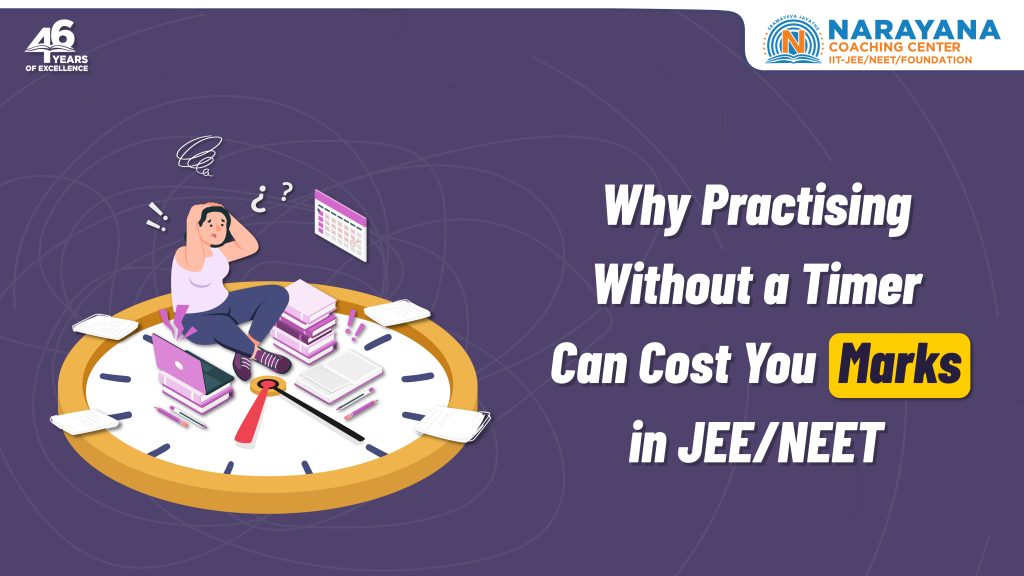
Preparing for competitive exams like JEE and NEET is not just about understanding concepts or solving questions—it’s also about doing so within a strict time limit. Both exams are designed to test not only knowledge but also speed, accuracy, and time-management skills.
Yet many students make the common mistake of practising without a timer. While it may feel comfortable to solve problems without pressure, this habit can seriously harm your performance in the exam hall.
Let’s break down why practising without a timer can cost you marks—and how to fix this mistake before it’s too late.
1. Why Time Is the Hidden Enemy in JEE/NEET
Every JEE and NEET aspirant studies hard, but not everyone clears the exam. Why? Because time often becomes the biggest hurdle in the exam hall. Even if you know the concepts, if you can’t recall and solve them quickly, you risk losing crucial marks.
Think about it:
- In JEE, even a 10-second delay per question can cause you to leave 5–10 questions unattempted.
- In NEET, spending 2 minutes on one tricky Biology MCQ may cost you the chance to solve 2–3 easy ones.
Time is not just a background factor—it’s a decisive factor that separates toppers from average scorers. That’s why practising without a timer is like running a race without ever checking your speed.
2. Why Students Lose Marks Without Timed Practice
a) Poor Time-Management Skills
Without a timer, students often spend too much time on tough questions. In the real exam, this can cause them to miss out on easy questions that could have been solved quickly.
b) A False Sense of Preparation
Solving a Physics or Chemistry problem in 10 minutes at home may feel like success, but in JEE/NEET you don’t have that luxury. Without timed practice, preparation becomes unrealistic.
c) Panic During the Exam
Students who never practise under timed conditions often panic once the clock starts ticking in the exam hall. This pressure affects both confidence and accuracy.
d) Inability to Prioritise Questions
Timed practice trains you to decide which questions to attempt first and which to leave for later. Without it, you risk wasting valuable minutes.
3. The Role of a Timer in Building Exam Readiness
Practising with a timer isn’t about rushing—it’s about training your brain to:
- Maintain accuracy under pressure
- Develop a steady problem-solving rhythm
- Balance speed with correctness
- Recognise when to move on from a difficult question
It’s like an athlete training with a stopwatch—speed is built only when time is measured.
4. Common Mistakes Students Make Without Timed Practice
- Spending 15–20 minutes on one Physics derivation.
- Taking 5 minutes for a Biology question that should take 30 seconds.
- Attempting the paper in a random sequence instead of following a planned approach.
- Ignoring OMR/bubble filling in NEET, which itself takes 10–15 minutes.
Each of these mistakes can cost you 20–30 marks—marks that could decide your rank.
5. How to Use a Timer Effectively in Practice
Here are some practical tips for Class 11th and 12th students:
a) Daily Practice Sessions
- Use a stopwatch or timer app while solving questions.
- Set a time limit per question:
- JEE: 2 minutes
- NEET: 1 minute
b) Mock Test Environment
- Take full-length mock tests under exact exam conditions.
- No breaks, no distractions—just like the real exam.
c) Section-Wise Timing
- Physics: Allocate fixed time per problem.
- Chemistry: Practise quick recall of reactions & formulae.
- Biology: Learn to read and answer within seconds.
d) Review After Practice
After each timed session, record:
- How many questions you attempted.
- How many were correct.
- Which topics consumed the most time.
This reflection will help you improve speed strategically.
6. Smart Strategies to Save Time in JEE/NEET
- Don’t get stuck: If a question takes more than 2 minutes, skip it and return later.
- Use elimination: In NEET, eliminate wrong options quickly instead of solving in full.
- Rely on mental calculations: Minimise dependency on rough work wherever possible.
- Apply shortcuts & tricks: Learn key formulae, approximations, and standard results.
7. Final Takeaway for Students
Time is the most important factor in JEE/NEET success. Preparing without a timer may build knowledge but not exam readiness.
To succeed, you must:
- Practise with a timer daily.
- Take timed mock tests regularly.
- Master the balance of speed and accuracy.
Remember, in exams such as JEE and NEET, success depends not only on what you know but also on how fast and accurately you apply it.
Conclusion
Practising without a timer creates a false sense of preparation. To score high in JEE/NEET, you must train yourself to work under strict time limits. Remember: knowledge + speed + accuracy = success.
So, start today, pick up your stopwatch, set your timer, and practise as if you’re already in the exam hall.
FAQs on Practising Without a Timer for JEE/NEET
Q1. Is it really necessary to use a timer while practising for JEE/NEET?
Yes. Without a timer, you won’t develop the speed required to attempt the maximum number of questions within the given time.
Q2. How much time should I spend on one JEE question?
Ideally, 2 minutes or less. If it takes longer, skip and return later.
Q3. Should I practise with a full-paper timer or a per-question timer?
Both are important. Per-question timers build speed, while full-paper timers build stamina.
Q4. How many mock tests should I attempt before the exam?
At least 10–15 full-length mocks under real exam conditions.
Q5. Does practising with a timer increase stress?
Initially, yes. But with regular practice, it builds exam-like resilience and confidence.
